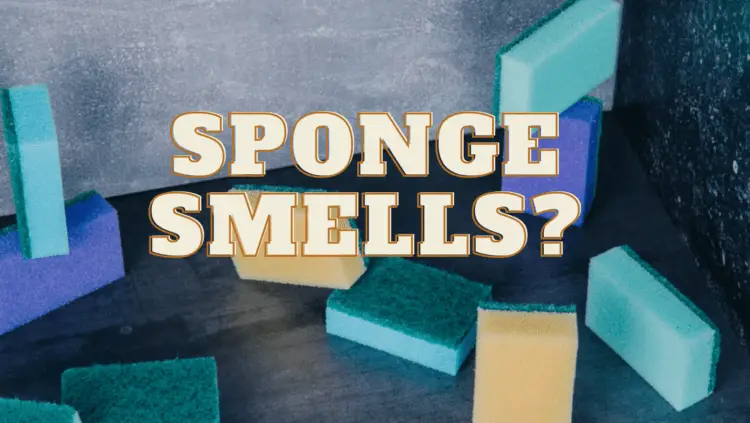Some sponges, like the cellulose sponge, are porous and absorb smells more readily than others. This is why some people’s kitchen sponges can take on unpleasant odors over time. Learn more about what causes your kitchen sponges to smell so you can choose the best one for your home.
Why does my kitchen sponge smell boast a commonly asked question?
Bacteria build-up
Bacteria is a single-cell organism that multiplies rapidly. As part of the bacteria’s life cycle, bacteria go from a dormant state to an active one in which they grow and divide. Bacteria need warmth, moisture, and nutrients to reproduce quickly. Sponges contain all three:
- The warmth from the kitchen sink
- Moisture from being wet
- Small amounts of food debris left behind by dishes and sponging off countertops
When bacteria contact these conditions, they will thrive and multiply. This causes your sponge to smell unpleasant or “ripe.”
Ammonia
Ammonia smells like urine. It serves as an appropriate analogy for why my kitchen sponge smells. Ammonia forms when proteins break down in moist environments. An example is your sponge after you use it to wipe up food particles. Ammonia smells unpleasant and can be harmful to inhale.
Moisture
Moist sponges that smell also contain bacteria. The bacteria break down the sponge’s cellulose structure into smaller fragments. It later leaves a slimy residue if left moist for an extended period. These trim pieces are harder to clean away from surfaces. They make your sponge effective at soaking up water and soap suds when cleaning dishes or wiping countertops. The more you wash your hands with a dirty smelling sponge, the more it spreads bacteria around your kitchen.
Dirty Sponge
One of the most common reasons a kitchen sponge smells is because you’re cleaning them with it. Food particles, grease & soap build up over time on a sponge. They create an unpleasant smell if not cleaned out frequently. So, it’s advisable to wash your sponge every week in the dishwasher (on high heat) or microwave for 2 minutes. Remember, bacteria love moist environments such as sponges that sit around wet after you clean something off with it. Anything from raw meat bacteria to mold will grow and multiply, causing your sponges odor.
Using Bleach
Using strong chemicals like bleach without rinsing will make your kitchen sponge smell as well.
Bleach is a chemical that kills bacteria and breaks down dirt and grease. Bacteria feed on the dead skin cells we shed every day. So, bleach will kill these bacteria if not rinsed away. Also, when there’s grease or other types of food in your sponge or dishrag, the food can break down and smell. People describe this kind of odor as smelling like sour milk or mildew.
The best way to wash sponges and dishrags is with soap and water. This is because antibacterial soaps contain chemicals that help prevent bacterial growth in the wet environment of your kitchen sponge. And you should always rinse them before hanging them up to dry.
You are not letting your sponge dry after use
You do not let your sponge dry after using it. Drying dishes with kitchen towels might be faster than allowing them to air-dry, but it can be risky too. If you leave kitchen sponges damp for an extended period, it becomes more challenging to get rid of moisture. This makes them perfect breeding grounds for germs and bacteria that will cause a foul smell in no time.
Using The Sponge Outside The Kitchen
You are using wet kitchen sponges outside the sink. Kitchen sponges have intended to wash dishes only. You should use them only in the kitchen for this purpose. Using it to clean countertops or windows can expose your sponges to different germs that are dangerous and lead to foul smells.
Dirty Sponge
You are not washing your sponge regularly. Kitchen sponges are excellent breeding grounds for bacteria. Bacteria worsen when you do not wash them frequently enough. You will notice why the smell becomes terrible if you leave them too long without regularly cleaning them.
Prolonged Use
You are using a kitchen sponge for too long, causes it to smell. The reason is that kitchen sponges absorb bacteria and dead skin cells. Continuous use of a kitchen sponge causes bacteria and dead skin cells to your food and then into your mouth.
While no one knows why it happens, there are benefits associated with changing your kitchen sponge. You can form a habit of replacing the sponge after every 2-3 weeks to keep bad smells and bacteria at bay.
Exposure to heat and sunlight
As most people would know, leaving sponges in the sunlight or exposing them to heat will cause them to smell quickly. So, you must leave your sponge flat on a clean surface, so they don’t keep the moisture from being against the wall.
Leaving your kitchen sponges out in the air means that you expose them to bacteria and germs, too. So, it’s also best not to keep them inside cabinets or drawers unless you have an enclosed case. When you’re done using your sponge, be sure to wash it with soap and water before hanging it up somewhere else dry.
If this is not possible, squeeze out any excess water before popping it into the microwave for about 30 seconds. Make sure it is not moist before you pop it into the microwave, or it will cause your sponge to explode and leave a huge mess.
Wrap Up
So, now that you know some reasons your sponge might smell, it’s time to keep it clean. If you use a dish drying rack, make sure you dehydrate your sponge before storing it away for next time. Taking other measures such as microwaving or tossing in the dishwasher will help kill off any bacteria that purify your sponges. But, if these tips don’t solve the problem, it’s time to replace them with a fresh one. Once one side of the sponge gets used up and can no longer hold any more dirt, then throw it out and get a new one. This way you can ensure better sanitary practices in your home.
Remember, sponges are cheap for a reason. If you want to avoid getting sick, replace your dank kitchen sponge every few weeks. Also, ensure it gets nice and dry after each use. This will cut the number of germs that accumulate on your sponge and keep it smelling fresh as well.




